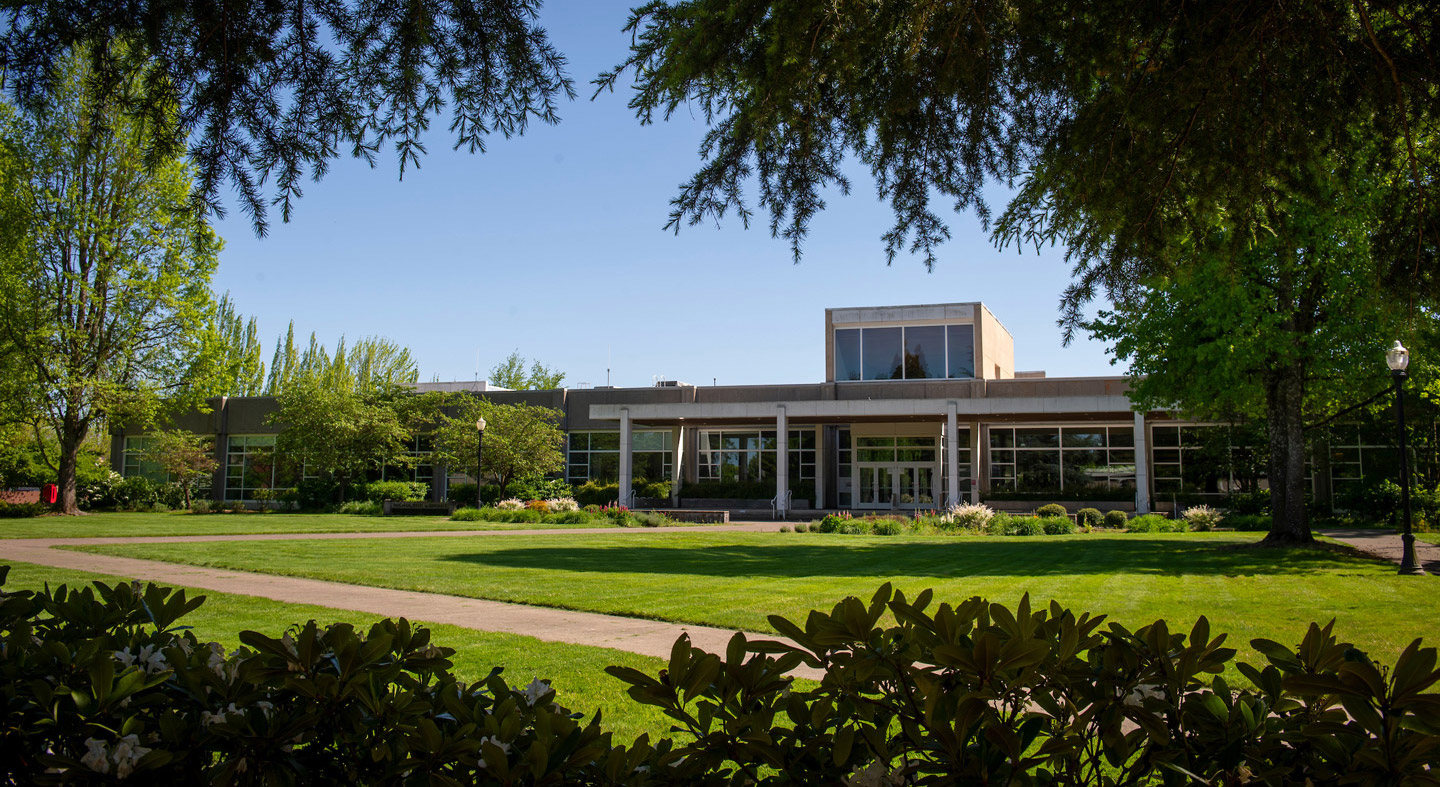
Historical preservation at Linfield University Archives
Student Are Agents of Change
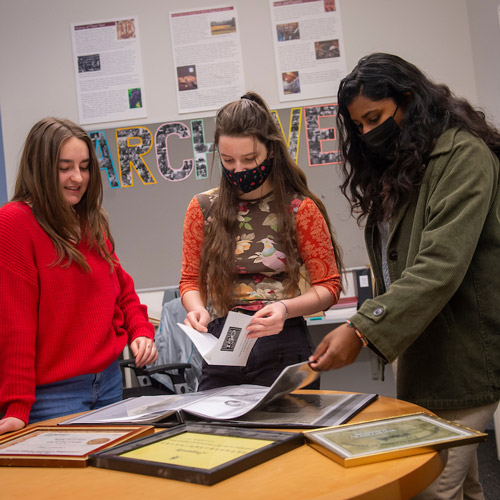

Historical preservation at Linfield University Archives

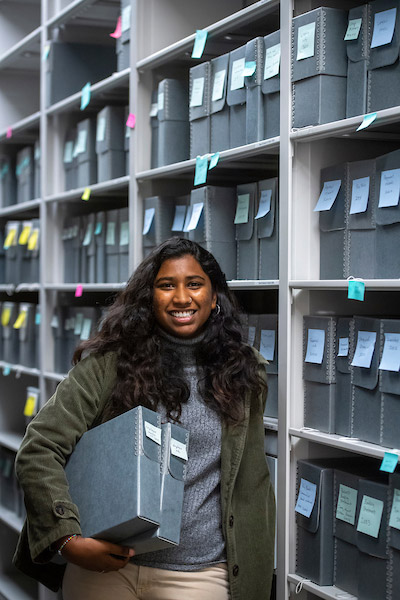
When she saw area wine businesses posting social media statements condemning the actions of a Minnesota police officer after the murder of George Floyd, she encouraged me to put out something similar, representing the archive's stance in solidarity. I agreed.
Linfield's archive is the official home of the Oregon Wine History.
Lily has a very strong – very strong – social conscience and she has pushed us into some directions that would not have necessarily come naturally to me or to the rest of us at the library.
Lily spotted another opportunity to be a change agent not long afterward – one that quite literally combats erasure in historical records. "Rich's allyship made me feel that I could continue to bring up other important suggestions," she said.
One of Lily's duties is helping collect oral histories from throughout the wine industry. But she found an oversight when she returned to summarize interviews before posting them to the Nicholson Library website.
No one they talked to had been asked their preferred pronouns and, in their absence, every interview subject was placed into the binary options of male and female. She asked if the question could be included in the intake form going forward. I took the conversation to other administrators at the library and, a short time later, new intake forms were being printed that included a question about preferred pronouns.
Lily saw how a non-binary person close to her struggled when others misgendered them.
"They are ready to be themselves and show the world, but they feel knocked down when they are misgendered. I want to do everything in my power to make sure they and others don't feel that way," Lily said.
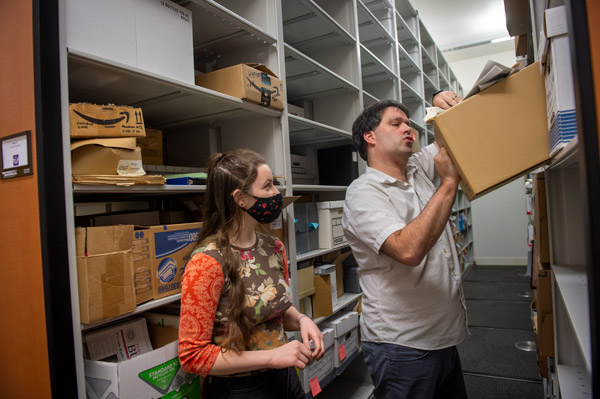 By including students at every step along the way to building the archives, Linfield offers students opportunities to expand their experiences well beyond the classroom and gain skills from opportunities they might never know existed otherwise.
By including students at every step along the way to building the archives, Linfield offers students opportunities to expand their experiences well beyond the classroom and gain skills from opportunities they might never know existed otherwise.
Student Layla Snyder '25, expected an Indiana Jones-esque dusty warehouse when she applied for a job at the archive. Instead, she discovered a clean, organized and temperature-controlled environment that invited in students, faculty, staff and visiting scholars.
At times the job is invigorating. Like when she took part in cataloging items and documents from a McMinnville-based, family-owned fruit preservation farm and business. Other times are more solemn. One of Layla's recent projects was cataloging items from a student who had passed away.
"It was a fairly new collection, and it was really emotional to see all of the notes and letters left from other students and friends," Layla said.
Layla is an education major but expects her experience in the archives to directly impact what she will do in the classroom. "I have learned important analytical and critical thinking skills that will be really helpful," she said.
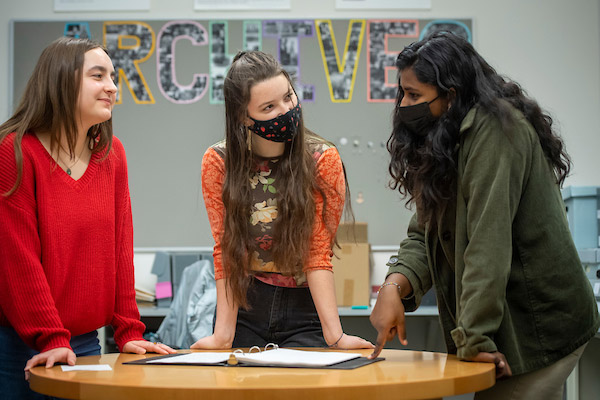 Old Latin choir books with brass buckles sit among motorized shelves that contain much of Linfield's history and other cherished keepsakes like hand-written notes from Fred "Mr." Rogers when he visited the campus in the 1980s. (The man had breathtaking penmanship on top of everything else he put out into the world.)
Old Latin choir books with brass buckles sit among motorized shelves that contain much of Linfield's history and other cherished keepsakes like hand-written notes from Fred "Mr." Rogers when he visited the campus in the 1980s. (The man had breathtaking penmanship on top of everything else he put out into the world.)
The centerpiece of the Linfield archive is the Oregon Wine History Archive, which is much more than a collection of old bottles. And it grows by the day thanks to the efforts of students and library employees.
It was a gift to receive the Oregon wine history project. Most universities have archives of their historical records, but the wine history archive gives us an opportunity to expand and be serious about the work at all levels.
Collecting oral histories from all points of view in the wine industry is a particular highlight for us. One summer, pre-pandemic, I logged 3,000 miles traveling throughout Oregon collecting stories. In 2021, Lily was part of a project titled "Entre Viñedos," which focuses on vineyard workers. The interviews were conducted mostly in Spanish, which gave her a chance to practice listening skills before studying abroad.
"It was a great experience because highlighting the people who do the hardest work is so important," Lily said.
They spend the first few days getting acquainted with the collections as a whole and then have opportunities to pick ones that align with their interests
We show them everything and expect them to find a path.
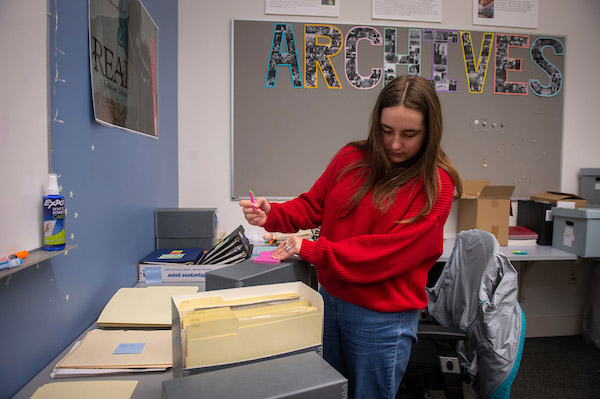 Some donations are so large that it can take time to get acquainted with their scope. One alumnus recently donated a collection that included items from his time at Linfield, mementos from when Linfield was named Linfield College, Linfield athletics items and newspaper articles, photos and other documents depicting life at Linfield and the McMinnville area.
Some donations are so large that it can take time to get acquainted with their scope. One alumnus recently donated a collection that included items from his time at Linfield, mementos from when Linfield was named Linfield College, Linfield athletics items and newspaper articles, photos and other documents depicting life at Linfield and the McMinnville area.
Student Olivia Rogers-Koch '25 tackled the collection as a mostly solo project.
"It's a very extensive collection and it took a while to sort through everything he donated," Olivia said.
She plans to major in psychology with a minor in history and the archive work provides a lens into the types of work available as a historian.
"I feel lucky that I get to continue to contribute to the preservation of history and that someday, the work I've done will be looked at by someone attempting to learn about Linfield and McMinnville's history," Olivia said.
The Linfield archive and other programs on Linfield campuses present students with opportunities to change the world, or even a small piece of it, for the better throughout their time as a Wildcat.
Lily, like Olivia, hopes that the work she's been part of at the archive, and the changes she's helped bring about, also echo through the ages.
"I hope that if someone gender non-conforming sees we are conscious about pronouns, they will feel more inclined to be a part of our bigger project."